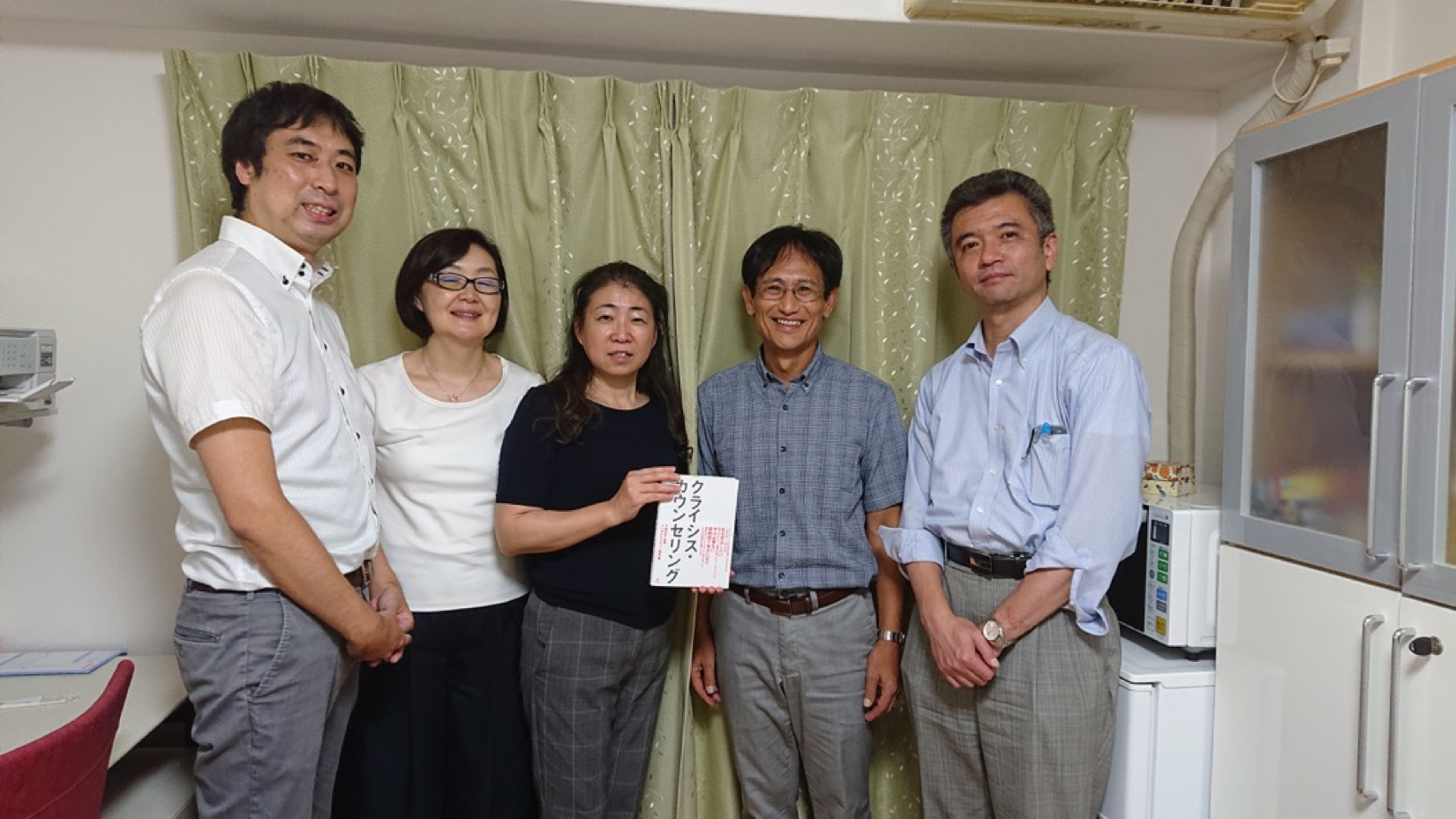NPO Mental Rescue Association
NPO Mental Rescue (“MR”), one of 2018 FIT For Charity Run beneficiary organisations, provides psychological support to clients who feel suicidal or in shock after a tragic event and training to spread psychological knowledge and counselling skills. We met with Chief Director Shimozono Souta and Director and General Manager Onoda Nami to hear about their story.

Pictured from left to right: Hiroshi Nakaya (FIT Communications Team), Ms. Ayumi Nishikawa (Instructor), Ms. Nami Onoda (Director and General Manager), Mr. Sota Shimozono (Chief Director), Mr. Jun Sanami (Instructor)
FIT: Please tell us why you started MR.
Onoda: Shimozono was contacted by the Ministry of Defense as a psychological expert and was appointed the role of Psychological Officer to oversee the entire Japan Ground Self-Defense Force. Psychological officers provided counselling on top of their regular work, but it did not lead to any promotion or salary increase. Therefore, I thought that if we established an external organisation which could assign professional qualifications, it will increase the motivation of the Psychological Officers. I knew Shimozono through the activities of another organization, and when I learned that he was establishing MR in cooperation with the Japan Self-Defese Force and the Tokyo Fire Department, I joined as a first-year student.
Shimozono: At the time of establishment, I was not able to work concurrently because I was a member of the Japan Ground Self-Defense Force. Therefore, I asked an alumni to start up MR and I became the Chief Director after I retired from the Japan Ground Self-Defense Force.
The Japan Ground Self-Defense Force must continue working even in challenging environments, such as when they are dispatched for disaster relief. The work is not only physically challenging but also emotionally and mentally challenging. The job of a Psychological Officer is to provide care to prevent experiences from becoming traumas. In the US this service is provided by Pastors but because Japan is a non-religious country, the role falls on the Psychological Officers. Firefighters who are also exposed to severe working conditions and experiences at emergency sites were just starting to establish and provide psychological support as well. Therefore, we established MR in the hope of spreading the knowledge we built through our activities to the private sector as well.
Specifically, we provide psychological care to people in the private sector in the event of an accident or suicide. When there is a suicide, people close to the person often hold themselves at fault and sometimes normal counselling is not enough. Normal counselling is usually centered around listening. Of course, we also listen to our clients, but we also provide relief to those who have been traumatised by an event, or those who carry feelings that may lead to death. It has been 10 years since we have established this “mental support organisation”, MR.
FIT: Please tell us more about the activities of MR.
Shimozono: Since our focus is on nurturing excellent counsellors, our main activities are providing educational courses. There are many counsellors who have studied general counselling, but this knowledge was not necessarily practical. We provide courses and exams for those counsellors.
In addition to providing indirect support, we also provide direct counselling support as well. For example, the Japanese Red Cross provides counselling support. However, there is no one caring for the mental wellbeing of the Japanese Red Cross staff themselves. That is where MR provides services. In addition, when Doctors Without Borders staff or JICA staff return from overseas, we conduct interviews. We have counsellors who have MR qualifications attend these meetings for on-the-job training.
Onoda: In addition to the activities already mentioned, each of our counsellors are very successful in their own fields as well. I have been providing counselling to teachers for 6 years and to the Police and other external organisations as well. Sometimes we establish teams and work together. We also provide counselling to the association headquarters.
FIT: What do you mean by “strengthening the heart”?
Shimozono: Please think about the definition of the strength of the mind. Most people will define it as the strength to be able to cope when something happens, or the strength to endure. But how about the strength to avoid the incident? Skills to respond to incidents are important. For example, there is a person who thinks too much and tries very hard to block their mind from thinking. However, even if they try very hard, some things will spill out naturally. We don’t think this is a problem. We believe this is a sign that the body is showing us about the future. What we want to focus on is to not make something zero. If someone has anxiety and has trouble focusing, it is important to control the anxiety in moderation. We work on finding and implementing a solution, like listening to music that relaxes you. We teach methods like these to strengthen your heart.
FIT: Please tell us when you feel rewarded and why you have continued your work?
Onoda: I have been able to continue my work largely because of my team. Of course, I feel happy when my client who I have been providing counselling to returns to work. There are many counsellors who does not want to be involved with matters regarding death. However, I have a keen interest in that area, and I have been providing counselling to those with terminal cancer for close to two years. I also feel rewarded when my field of counselling slowly expands.
Shimozono: Of course client recovery is the base of my motivation in continuing this work. However, I feel most rewarded when nurturing excellent counsellors. Our exams are based only on performance and not on writing. We believe that no matter how much knowledge you have, if you cannot put it to use in practice it is meaningless.
FIT: Is MR facing any hurdles currently?
Onoda: Our current dilemma is that we want to expand MR, but at the same time we don’t. We aim to nurture excellent counsellors that will excel in Employee Assistance Programs (EAP) at companies and other fields. In order to do so, we want to work closely with each counselor. Therefore, we are not able to expand MR too much as we will not be able to provide personal attention to each individual if the number of students increases. Moreover, it takes time to nurture excellent counsellors. Nurturing counsellors does not mean only providing them with educational courses. We focus on quality over quantity. However, another dilemma is that if MR is not well known, it becomes difficult to convey the value of having a MR qualification. However, organisations that really need support have gained understanding of MR and we are slowly expanding.
FIT: Please tell us about the future plans of MR.
Shimozono: Since establishment, we have been active in the Kanto area for about 8 years, and we plan to expand to Sendai, Fukuoka, Nagoya, Osaka, and Hokkaido. We have about ten counsellors who can be instructors and we can finally start to expand.
FIT: Please tell us about how the FIT donation was used.
Shimozono: Recently, suicide prevention counselling is being conducted using SNS. Counselling provided through SNS is very difficult. A counsellor may suddenly receive a message that only says “I want to die,” or suddenly stop receiving replies, or needs to be glued to the SNS at all times. In many cases, the counsellors themselves become troubled. We would like to spread the knowledge that we have built at MR to the world of SNS counselling. This year, we plan to conduct two independent trials towards counselling organisations that use SNS tools like Line. Through the trials, we would like to spread care product for counselolrs.
Onoda: If you have an opportunity, please take a look at Chapter 4 of SNS Counselling Handbook (ISBN:9784414416541), which was published in June 2019. We wrote this chapter and it is about crisis intervention counselling. (http://www.seishinshobo.co.jp/book/b453545.html)
FIT: Please share your message to FIT volunteers and participants!
Onoda: I think your energy is amazing. I also think the strong horizontal connection through the financial world is amazing as well. I am inspired by your passion to contribute outside of your own jobs. About 30 people from MR attended last year’s FIT For Charity Run. We took photos at the end and we had a lot of fun. It was great to learn about FIT’s activity and it has been a good influence on us.
Shimozono: We were very inspired when attending the charity meetup event and other FIT events. Thank you very much.
NPO Mental Rescue Website: http://mentalrescue.org/about/gaiyo.html

